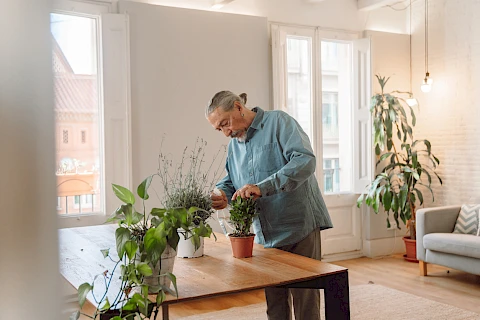
Indoor gardening is a delightful pastime that brings nature indoors. For many seniors, engaging in therapeutic activities is crucial for maintaining mental and physical well-being. Fortunately, you can put together an indoor garden and enjoy its benefits regardless of the season.
The Benefits of Indoor Gardening for Seniors
Indoor gardening is not just a hobby; it provides many benefits for both mental and physical health. Gardening has a notable impact on mental health by reducing stress and anxiety and providing a calming and peaceful activity. Working with plants can enhance mood and emotional well-being, lifting spirits and fostering happiness. Additionally, gardening gives a sense of purpose and accomplishment as seniors watch their plants grow and thrive.
The physical benefits of indoor gardening are equally important. It encourages light physical activity, which can help maintain strength and balance. Gardening tasks can also improve motor skills and dexterity, as seniors engage their hands and fingers. Plus, routine and daylight exposure can promote better sleep patterns.
Setting Up an Indoor Garden
Creating an indoor garden involves a few essential steps, from choosing the right space to selecting suitable plants and gathering the necessary tools. First, assess the light conditions in your home. Choose a space with ample natural light, such as near a window. The area should also be accessible, making it easy for seniors to reach and tend to their plants.
When it comes to plant selection, low-maintenance options are best. Consider plants like succulents, herbs, or spider plants that require minimal care. Also, think about plants with therapeutic benefits, such as those with fragrant leaves or flowers that can uplift the mood.
Starting an indoor garden doesn't require a lot of equipment. Basic gardening tools, like small trowels and watering cans, will do the trick. You'll also need containers and soil suited to the plants you choose.
Maintaining an Indoor Garden
Keeping an indoor garden healthy requires regular care, from watering and feeding to pruning and handling seasonal changes. Establish a routine for watering your plants. Understanding each plant's water needs is crucial, as over- or under-watering can harm them. Regular feeding with appropriate fertilizers can also ensure your plants thrive.
Regular maintenance is key for a healthy garden. Trim dead leaves and branches to encourage new growth. Watch for signs of plant health issues, such as yellowing leaves or pests, and address them promptly. Adjust care routines for different seasons. For instance, indoor gardening during winter may require additional light sources, like grow lights, to compensate for shorter daylight hours.
Involving Seniors in the Gardening Process
For seniors, being actively involved in gardening tasks can be deeply rewarding. Here's how caregivers can make the experience engaging and manageable:
- Create a gardening schedule: Develop a plan of daily and weekly tasks. Include seniors in the planning process to make them feel invested.
- Encourage participation: Make gardening a social activity. Involve family members or friends to make the experience more enjoyable.
- Assign manageable tasks: Give seniors responsibilities that match their abilities to keep them engaged without overwhelming them.
- Adapt to physical limitations: Use ergonomic tools and aids to reduce strain. Modify tasks for comfort, such as using raised planters or setting up seating arrangements.
These strategies can encourage seniors to participate more actively in gardening, allowing them to reap those important benefits.
Care at Home for Seniors
Indoor gardening offers numerous mental and physical benefits for seniors. It's a rewarding activity that can bring joy, purpose, and a sense of accomplishment. Now is the perfect time to start an indoor garden and experience its therapeutic advantages.
In many cases, seniors may find that, as they age, they need more help around the house and with basic daily care tasks. For more support and services tailored to seniors in San Jose, Santa Clara, Santa Cruz, and Campbell, contact Senior Helpers San Jose.